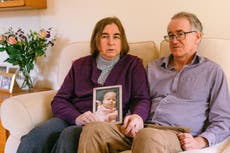Head of NHS inquiry warns other families could be victims of cover-ups
'It's impossible to rule out there being other people who are in a similar position — I know of some who are,’ says Dr Bill Kirkup

The chairman of an inquiry that has confirmed a 20-year cover-up over the avoidable death of a baby has warned there are other families who may have suffered a similar ordeal.
Publishing the findings of his investigation into the 2001 death of Elizabeth Dixon, Dr Bill Kirkup said he wanted to see action taken to prevent harmed families having to battle for years to get answers.
Dr Kirkup, who has been involved in multiple high-profile investigations of NHS failures in recent years, said: “There has been considerable difficulty in establishing investigations, where events are regarded as historic. I don't like the term historic investigations. I think that these things remain current for the people who've suffered harm, until they're resolved, it’s not historic for them.
“There has been significant reluctance to look at a variety of cases. Mr and Mrs Dixon were courageous and very persistent and they were given help by others and were successful in securing the investigation and it worries me that other people haven't been.
“I do think we should look at how we can establish a proper mechanism that will make sure that such cases are heard.
“It's impossible to rule out there being other people who are in a similar position. In fact, I know of some who are. I think it's as important for them that they get heard, and that they get things that should have been looked at from the start looked at now, if that's the best that we can do.”
In 2014, NHS England pulled out of a planned inquiry into Elizabeth’s care, causing the investigation to collapse and forcing the family begin their fight for the truth again.
Dr Kirkup said he understood why NHS England considered the investigation not to be part of its role, but he added: “I'm less sympathetic that there wasn't an alternative set up for a good two years later.”
Among his recommendations for improving services, Dr Kirkup said he hoped Hampshire Police would refer themselves to the Independent Office of Police Conduct which would then trigger a new police investigation.
Dr Kirkup said he wanted to see a mechanism to hold individuals to account for giving false information or concealing information relating to public services, and for failing to assist investigations.
Other recommendations include a greater emphasis on high blood pressure among children with better information for doctors and to ensure it was part of routine observations. He also said mental or physical disability should not be justification for different standards of care in the community commissioned by the NHS.
Additionally, Dr Kirkup wants medical examiners to be made independent of the NHS and said there should be a better system for responding to complaints and to use them to improve services.
He also recommended a “stop mechanism” be implemented for professional regulators and police where investigations reveal systemic or organisational failures that should then trigger a wider inquiry into systemic problems beyond individuals.
Other recommendations included a review of the clinical expert witness system which he labelled as “haphazard” and better training for clinicians around clinical error and how to respond openly.
Join our commenting forum
Join thought-provoking conversations, follow other Independent readers and see their replies
Comments

Bookmark popover
Removed from bookmarks